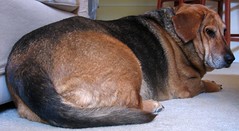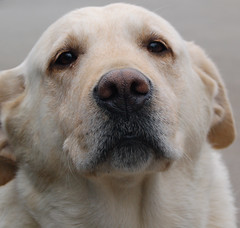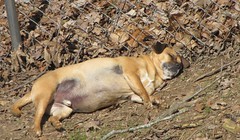Managing Cushings disease in dogs holistically
 Over the years of practicing holistic medicine I was gone from thinking I could help control the symptoms of Cushings disease in dogs to now having dogs in my care who are completely controlled with diet, herbs and acupuncture.
Over the years of practicing holistic medicine I was gone from thinking I could help control the symptoms of Cushings disease in dogs to now having dogs in my care who are completely controlled with diet, herbs and acupuncture.
What do you do if your dog has Cushings disease?
-
- Pull all grains and most of the carbohydrates out of their diet. Feed them the least processed diet that they can tolerate. Raw high protein diets are best. If raw is not possible feed them a grain free, potato free, high protein, high quality canned food such as Instinct. Home cooked diets like the diet I use for animals with cancer are also great. See Diets for cancer in cats and dogs. The same dietary approach to cancer is also good for Cushings disease. Do not feed these dogs dry food!I have found that changing diet alone can make a huge difference in these dogs so if you can only work with diet you can still help your animal friend.
- Treat the dampness and inflammation. This is the best way to get their endocrine system back to normal regulation. In most dogs, the best Chinese herbal formula for this is called Si Miao San. This formula helps to decrease inflammation in the body, regulates insulin, and improves digestion. I sometimes add corn silk to this formula to help with problems with insulin resistance. Not surprisingly this is also one of the main formulas I use for diabetes. Si Miao San is not always the best formula for all dogs with Cushings. Si Miao San works best for the hot, panting, overweight Cushings dog. When I work with thin, weak dogs there are other herbals that work better. If at all possible find a veterinary herbalist to help you with this.
- Acupuncture. I have so much more success in those dogs I can treat with needles. Acupuncture helps to regulate the endocrine system and reduce inflammation in the body. I have found that many dogs will only need acupuncture about every two months once we get them stable unless we are treating other health issues as well.
- Ginkgo biloba can be helpful in treating Cushings. Ginkgo slows the release adrenal hormone and can help to control Cushings disease. I do not use this herb with all the dogs I treat as I have found it not to be as effective as Si Miao San, acupuncture and diet change. However it does seem to be the herb that can be added to the protocol if you are not getting as much symptom control as you think you should be. It is very much my tipping point herb and sometimes it makes the difference between good control and mediocre control of this disease.Ginkgo is also a great herb for helping with dementia, high blood pressure, and protecting against heart disease and stroke. Because of this I often recommend it in my older animals. One of my favorite ginkgo product is made my Animal Apawthecary and also contains hawthorn. It is called Animals’ Apawthecary Hawthorn Plus
. I also make a powder version of this formula called Heart and Brain Support through my etsy shop. - Be aware that a natural approach can change the amount of Trilostane and other drugs that are needed to control this disease. Work with your vet to monitor signs of drug overdose if your dog is already on Trilostane or Lysodren, when they are being treated naturally. If your dog stops eating, becomes lethargic, or has sleep disturbance or vomiting and diarrhea contact your vet immediately. This could be a sign of overdose.
I have had a number of dogs who we have gotten completely off of Trilostane (the main drug to treat Cushings disease) or significantly reduced the dosage. If I can catch it early many dogs never need to use the western drugs.
One of my favorite dogs with Cushings disease is a cute little Cairn Terrier I treat named Clancy. He’s a fun little guy with a lot of spunk. We were able to catch his Cushings disease very early about a year and a half ago, just after he was diagnosed. His main symptoms were increase in weight, panting and that he was much more jumpy when touched and startled easily. He also drunk a lot of water and was always hungry. Through acupuncture, herbs and diet we have been able to keep Clancy happy and symptom free. Occasionally he will have a little flare up of symptoms but so far we have been able to treat those flare ups with acupuncture and some herbal and dietary changes. I’m hopeful that Clancy will never need Trilostane or other western drugs.
So what is Cushings disease?
If you have found this article you may already know about Cushings. For those of you that don’t here is a short explanation.
 Cushings disease is caused by an overactive adrenal gland which produces too much adrenal hormone. Most of the time this is caused by a benign pituitary tumor in the brain which signals the adrenal to produce more hormone than it needs. Occasionally this is caused by an adrenal tumor in the actual gland. Usually with an adrenal tumor, removal is recommended. However with pituitary tumors removal is too difficult and the treatment of choice is to use a drug called Trilostane which stop the production of adrenal hormone through blocking its release. This can be risky because if too much hormone is blocked the animal can become seriously ill.
Cushings disease is caused by an overactive adrenal gland which produces too much adrenal hormone. Most of the time this is caused by a benign pituitary tumor in the brain which signals the adrenal to produce more hormone than it needs. Occasionally this is caused by an adrenal tumor in the actual gland. Usually with an adrenal tumor, removal is recommended. However with pituitary tumors removal is too difficult and the treatment of choice is to use a drug called Trilostane which stop the production of adrenal hormone through blocking its release. This can be risky because if too much hormone is blocked the animal can become seriously ill.
The main symptoms of Cushings disease are a pot bellied appearance, excess hunger and water consumption, and hair loss on the sides. Many dogs have a tragic look to them. In addition Cushings disease can cause weakness and panting. These dogs have a weakened immune system and are prone to infections and cancers. People will often times describe their dogs with Cushings as more agitated and some dogs will have issues with sleeping through the night.
Here are a couple other good articles about Cushings disease and it’s treatment
Cushing disease
FDA cushings disease and Trilostane
 An amazing things I recently learned about Cushings disease is that it appears to be closely related to type 2 diabetes. In fact there are those that believe that both diseases are the same syndrome, just manifesting differently. When brain scans were done of cats with insulin resistant type 2 diabetes, it was found that in those cats with insulin resistance had pituitary tumors characteristic of Cushings disease. Wow!
An amazing things I recently learned about Cushings disease is that it appears to be closely related to type 2 diabetes. In fact there are those that believe that both diseases are the same syndrome, just manifesting differently. When brain scans were done of cats with insulin resistant type 2 diabetes, it was found that in those cats with insulin resistance had pituitary tumors characteristic of Cushings disease. Wow!
Prevelant of pituitary tumors among diabetic cats with insulin resistance
Both diseases seem to be induced by an overload of nutrients of the carbohydrate variety. Animals with Cushings disease and diabetes develop what is called metabolic syndrome. There body can not handle the amount of carbohydrates and high glycemic index ingredients in many of the processed diets we feed them. These high glycemic index diets cause high levels of inflammation in their bodies, which lead to problems in the endocrine system. This can lead to insulin resistance, development of pituitary tumors, or other inflammatory diseases.
You can pull up a great lecture on the subject of inflammation, diet and the endocrine system by one of my herbal teachers, Dr. Steve Marsden by following this link (brings up a PDF).
Management of inflammation using chinese herbs and diet
 While I have not been able to get all dogs controlled without western drugs, usually we are at least able to significantly reduce clinical signs and/or reduce the dose of drugs needed to regulate this illness. In a disease with not many good safe options for treatment, I love having effective natural options to offer the animals I work with.
While I have not been able to get all dogs controlled without western drugs, usually we are at least able to significantly reduce clinical signs and/or reduce the dose of drugs needed to regulate this illness. In a disease with not many good safe options for treatment, I love having effective natural options to offer the animals I work with.
As with all advice offered on this website please check with your animal’s veterinarian before changing your animal’s medications or adding any herbals.
Tags: cushings, diet, dog, health, si miao san


July 21st, 2011 at 3:10 pm
From Jennifer
How do i find an acupuncturist who can do this correctly for my dog?
He is a 12 year old scottish terrier and was often mistaken for a puppy 7 months ago when he weighed 15 lbs. He is now 10.2 lbs and i can see his spine and ribs through his coat. Now he looks old and tiny. He never really got that fat saggy look, just skinny. His liver levels are a little high and we saw a holistic vet that put him onto Demarin. He started getting diarhea after starting on the Demarin. It was suggested that he take the Demarin every other day instead of daily. I stopped it a week ago because now i just want him to gain some weight again and his liver can start to try to regenerate in a few months, i figure.
Why do you suggest a raw diet for Cushing’s patients?
Our other vet who used to be a butcher doesn’t trust raw food in this country.
My dog loves chicken but enjoys eating just about anything. What is the best diet of raw food for a scottie?
Where can i find herbs for a skinny little cushing’s dog?
Thank you for any help you might be able to offer.
We are in the Westlake Village/north Los Angeles area.
July 21st, 2011 at 3:14 pm
The best tool I have found for finding a veterinary acupuncturist is through the ivas website (link is below). You may have to ask an individual vet if they are skilled in herbal medicine. If he is on the skinny side I would find a vet with herbal experience that can help you with herbs. I work with a lot of different formulas for the skinny guys and don’t have a really good way of finding the right one without a dog in front of me.
http://www.ivas.org/Members/VetSearch/tabid/124/Default.aspx
I find the raw diets help to slow down the passage of food and reduce the inflammation spikes in digestion that seem to contribute to Cushings disease. I have also had dogs that do very well on grain free canned so definitely an option if you don’t want to do raw. I usually use a local company for raw food called Darwin’s which is in Seattle but there are also other good companies. Nature’s Variety also has a nice line.
http://www.darwinspet.com/
I have found raw diets to be very safe in my experience. I always have people start slowly and pick a good frozen product or freeze before feeding if they are making the diet themselves.
One very good way I have helped dogs fatty up and by adding an egg a day to their diet and some canned sweet potato or pumpkin. I had one dog that gained 20 lb in a month with just these additions.
Hope this helps!
best wishes,
Lena
August 15th, 2011 at 3:48 pm
We’ve fed our Blue Heeler a raw food diet for 12 years. We saw a show about BARF (Biologically Appropriate Raw Food) from a vet in Australia and it sold us on the idea. For years we would buy various meat – ALL FDA approved for human consumption – and often feed it to her frozen (thousands of sled dogs have lived off of frozen fish), but in the past several years we have been cooking her food because it is difficult to manage raw food. Mostly she had chicken breasts these days. She might eat a handful of bison/venison dry kibble once every 2-3 months, and never has canned commercial food. We are very much supporters of ‘raw food’ for dogs and cats.
But this afternoon she has been diognosed with Cushing’s Disease, as well as a malignant tumor, but she does not have diabettes. There is no way I can afford the treatment, or even the further tests to confirm the disease, but she is has classic symptons and her bloodwork indicates that is what it is. I could barely afford the vet bill today. From what I’ve been rading online about this disease, it isn’t something that can be fixed, but I will keep looking to try to find a way to ease her pains – within my budget.
August 16th, 2011 at 8:03 am
Hi Kerry,
Through acupuncture and herbs I have been able to help control the symptoms of many of these dogs. Sometimes we need to use low doses of drugs as well which may be cheaper if the dosage is very low. A couple thoughts
if you have a good veterinary herbalist in your area it might be worth the money of a consult to get her on the right track. IVAS has a tool to find a vet in your area (some of the vets just do acupuncture so you may have to call a few to find someone with training in herbs). I have had a lot of success with using Si Miao San for many of these dogs so they may end up using that herbal or a modified version of it.
Also I would look online to see how cheaply you can get the drugs needed to treat the disease. Many times the online pharmacies are much, much cheaper than your vet’s prices.
While most of the dogs I have seen with Cushings are on highly processed diets it is not always the case.
best of luck
Lena
November 13th, 2011 at 6:20 pm
Thank you for your helpful information. I wish you were in San Diego, CA so we could have you treat our boxer, who has been diagnosed with a borderline Cushings Disease. I love our vet, & are treating with Trilostane over the past year–it’s been challenging to regulate. I am now switching over to raw food diet as well. I would greatly appreciate your recommendation of a holistic vet as through & knowledgble for our area. Thank you again.
November 14th, 2011 at 8:37 am
HI Patricia,
You should be able to find someone down that way. The best tool is to use IVAS’ find a vet http://www.ivas.org/Members/VetSearch/tabid/124/Default.aspx . However not all good holistic vets are listed on this tool so also ask around at the local pet food store or at the dog park. Your western vet also may know a good holistic vet. From my experience the western vets I work with are very open to having clients work with me as well. One thing to watch for with the raw food is that you may find a time when the Trilosten dose needs to be lowered so keep an eye out for appetite decreases or other signs of that s/he is not feeling well.
best wishes,
Lena
November 21st, 2011 at 4:03 pm
Lena-
Thank you for your help & link. With your help I found a holistic vet & am awaiting our 1st appointment. I look forward to a more rounded approach to managing by Boxer’s Atypical Cushings Disease. It’s been over a year on the roller coaster of tests, labs, & medications. I am in the health care field myself & have realistic expectations but know there has to be a better approach to give my Boxer a better quality of life then he has now. I understand what you are saying on watching s/s of the Trilostane toxicity with the raw food diet–he is now down to 15 mg a day in the a.m. & sometimes p.m depending on his behavior. Thank you again please say a prayer for health & healing for sweet Bobby Boxer.
November 21st, 2011 at 7:25 pm
I’m so glad you found a holistic vet. I really hope everything goes well for Bobby!
best wishes,
Lena
December 26th, 2011 at 10:36 am
Comments are closed on this article. Please join us in the forums if you want to discuss.
http://pathwithpaws.com/forums/